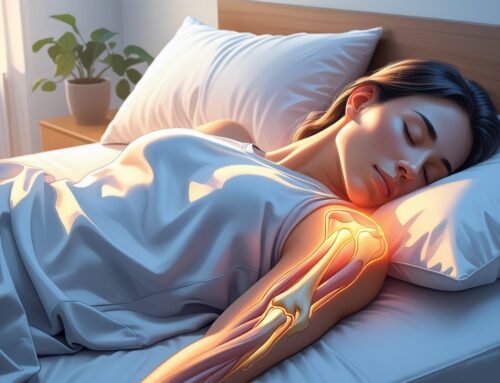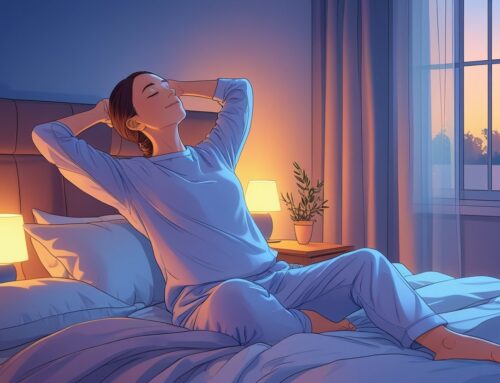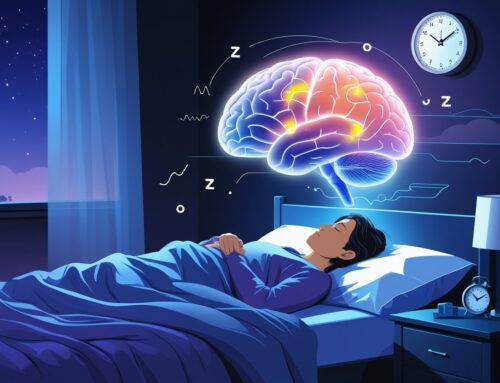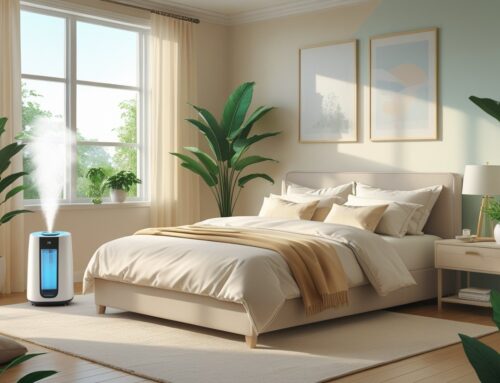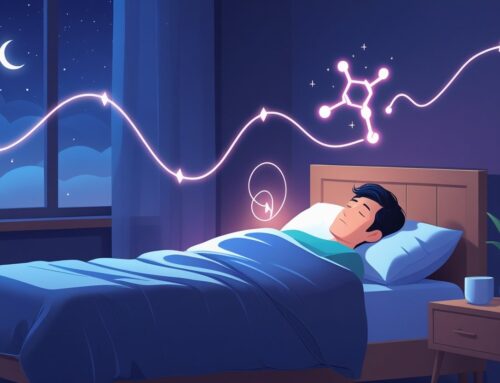Sleep has a big role in how someone looks and feels. Good rest gives the body time to repair the skin, smooth out fine lines, and keep a natural glow. Without enough sleep, the signs show up quickly—dark circles, dull skin, and tired-looking eyes are common. While resting, the body produces growth hormones that repair damaged cells and keep the skin firm. Sleep also helps balance stress hormones, which affect both skin and hair. Poor sleep can throw this off, leading to breakouts, oily skin, or even early wrinkles.
Choosing better sleep habits can improve overall appearance and well-being. A calm bedtime routine, a supportive mattress, and enough hours of rest give the body what it needs to recover. Over time, these small choices add up, helping the skin look healthier and fresher.
Key Takeaways
- Sleep restores the skin and keeps a healthy complexion.
- Lack of rest leads to dark circles, wrinkles, and dullness.
- Consistent sleep habits improve both appearance and health.
- A supportive mattress encourages deeper rest, boosts collagen repair, reduces puffiness, and helps skin look brighter in the morning.
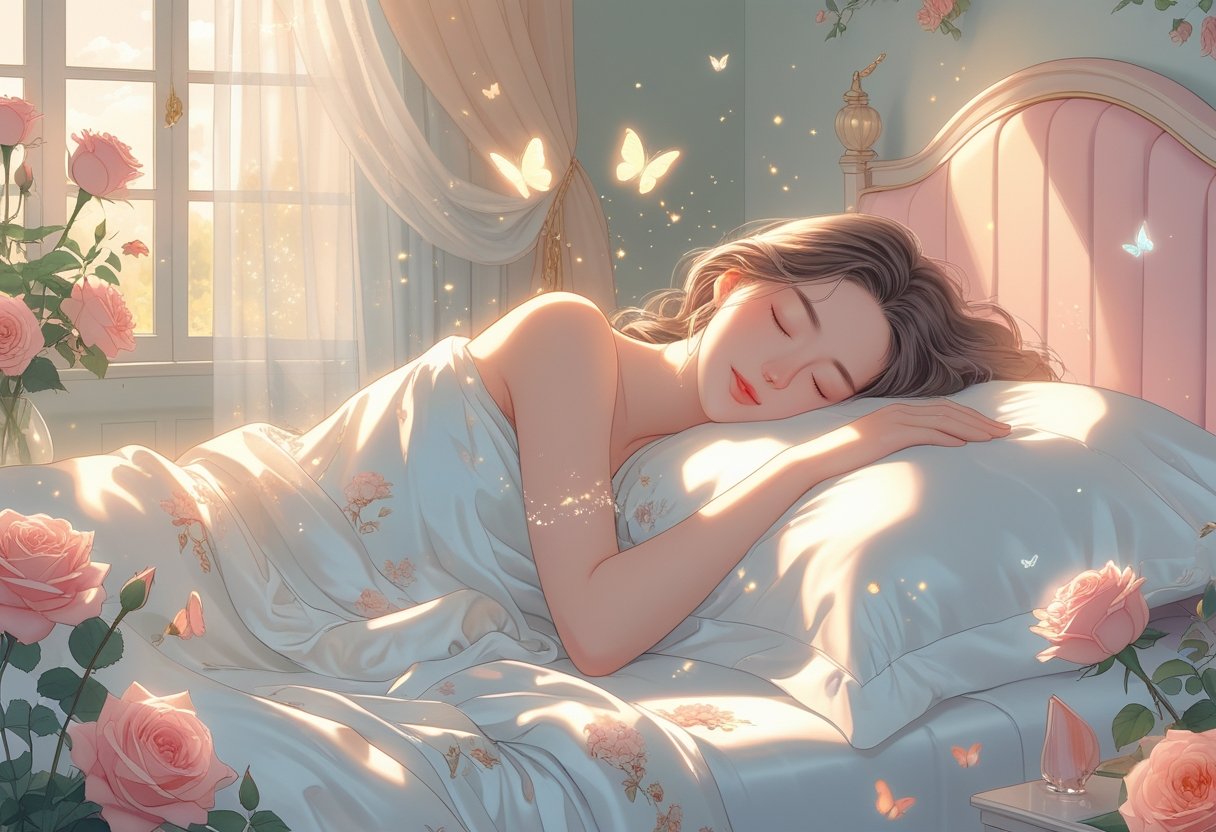
What Is Beauty Sleep?
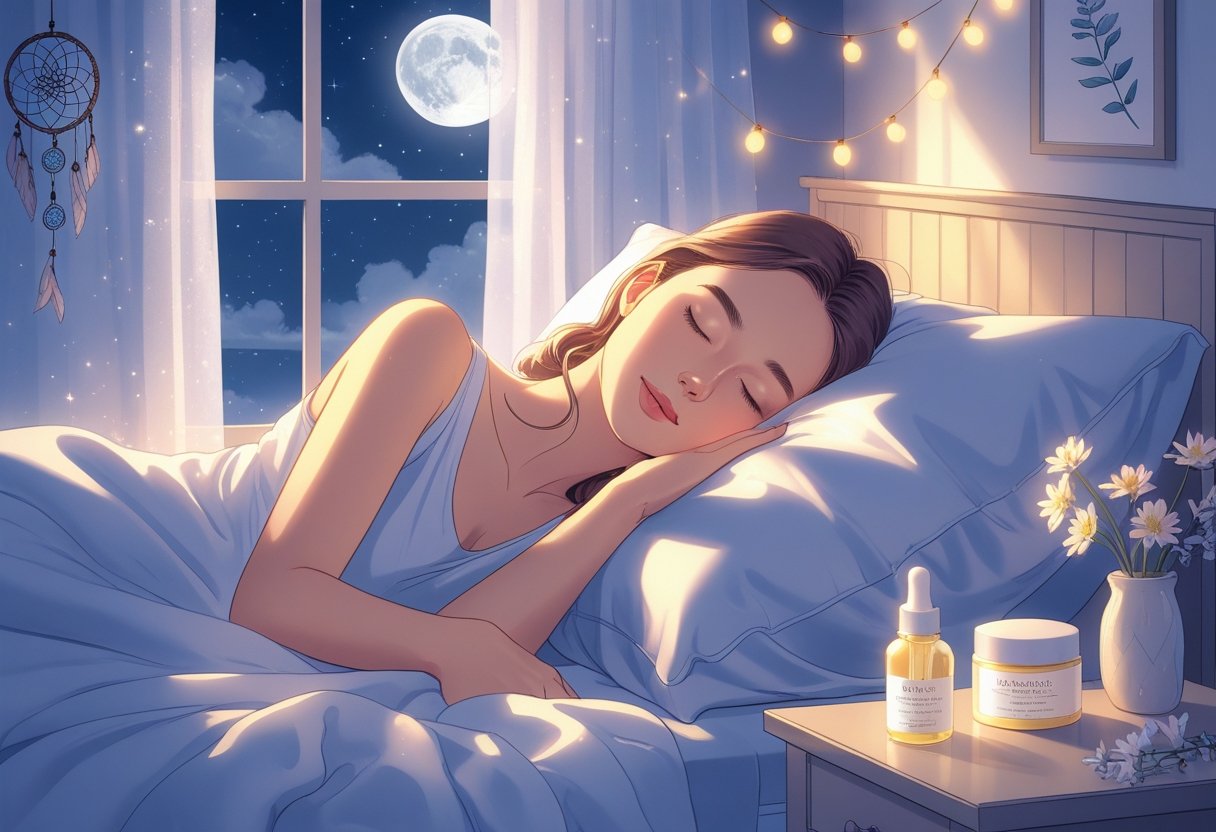
Beauty sleep means getting enough rest that helps the body heal and recover, especially the skin and hair. During sleep, the body goes through natural processes that repair damage and restore balance. This is why a good night’s rest can change how someone looks and feels the next day.
The Meaning and Origins of Beauty Sleep
The phrase “beauty sleep” comes from the old belief that sleep improves appearance. People noticed that after real rest, faces looked fresher and healthier, so the term stuck. It has been around for centuries and still carries the same idea today.
Beauty sleep is not about sleeping longer, but about sleeping well. The focus is on consistent, high-quality rest. Research supports that sleep helps skin stay clear, eyes look brighter, and overall glow returns. While the idea may sound simple, science explains how it works.
Science Behind Restorative Sleep
At night, the body shifts into repair mode. Growth hormones are released, which rebuild skin cells and reduce swelling. This helps the skin recover from daily stress like pollution or sunlight. The immune system also strengthens, which supports healing from within.
Sleep also controls stress hormones. When stress hormones rise, they can hurt the skin and hair. Balanced sleep lowers this risk and supports brain function, which affects how alert and healthy someone looks. Without good sleep, the skin can look pale, eyes can get puffy, and wrinkles may stand out more.
What Makes Sleep Good for Beauty
Three main factors explain why sleep helps appearance: skin repair, hormone balance, and stress relief.
- Skin Repair: Deep sleep boosts blood flow to the skin, helping fix damage from daily exposure.
- Hormone Balance: Rest lowers cortisol levels, which in high amounts can trigger acne, oily skin, or hair loss.
- Stress Relief: Quality rest reduces tension, which can prevent dark circles and weak-looking hair.
Healthy sleep habits play a big role. Going to bed at the same time each night and avoiding screens before sleep helps the body stay in rhythm. In the long run, consistent quality rest keeps the skin smoother, hair stronger, and overall appearance healthier.
How Sleep Affects Your Appearance
Sleep has a direct impact on how a person looks, especially when it comes to their skin and face. A good night’s rest allows the skin to repair itself and stay balanced. Without it, changes in appearance become clear to others, showing up in ways that are hard to hide.
Sleeping and Skin Health Relationship
During sleep, the body repairs damaged skin cells and produces proteins like collagen and elastin. These proteins are responsible for keeping skin firm and flexible. When rest is cut short, collagen levels drop and the immune system weakens, leading to dull skin, wrinkles, and signs of early aging.
At night, blood flow to the skin improves, bringing nutrients and clearing out waste. Interrupted sleep gets in the way of this process, which can cause dryness, flaking, or extra oil on the surface. The body’s circadian rhythm, which manages many skin functions, also depends on consistent sleep. Skipping rest or changing sleep patterns disrupts this rhythm and harms skin health.
Sleep vs No Sleep Face Changes
Lack of rest changes how the face looks in noticeable ways. The skin can lose its natural glow and appear pale. Dark circles and puffiness under the eyes form because of blood vessel changes and less oxygen reaching the area. Tired muscles in the face may cause drooping eyelids and loose skin.
People who rest well tend to look healthier and more refreshed. In contrast, fatigue brings out deeper lines, wrinkles, and expressions that make someone look older or worn out. These changes affect how others view a person’s energy and overall health.
The Effect of Sleep Deprivation on Facial Features
When sleepless nights add up, the effects show more strongly over time. Stress hormones rise, which increases oil on the scalp and skin. This can cause acne and greasy hair. Stress from poor sleep also interferes with normal hair growth, leading to thinning or even hair loss.
Over time, the skin loses more elasticity, resulting in fine lines and deeper wrinkles. Eyes may stay red or swollen, giving the face a consistently tired look. Together, these signs create what many call a “sleep-deprived face,” where the features reflect poor rest and stress.
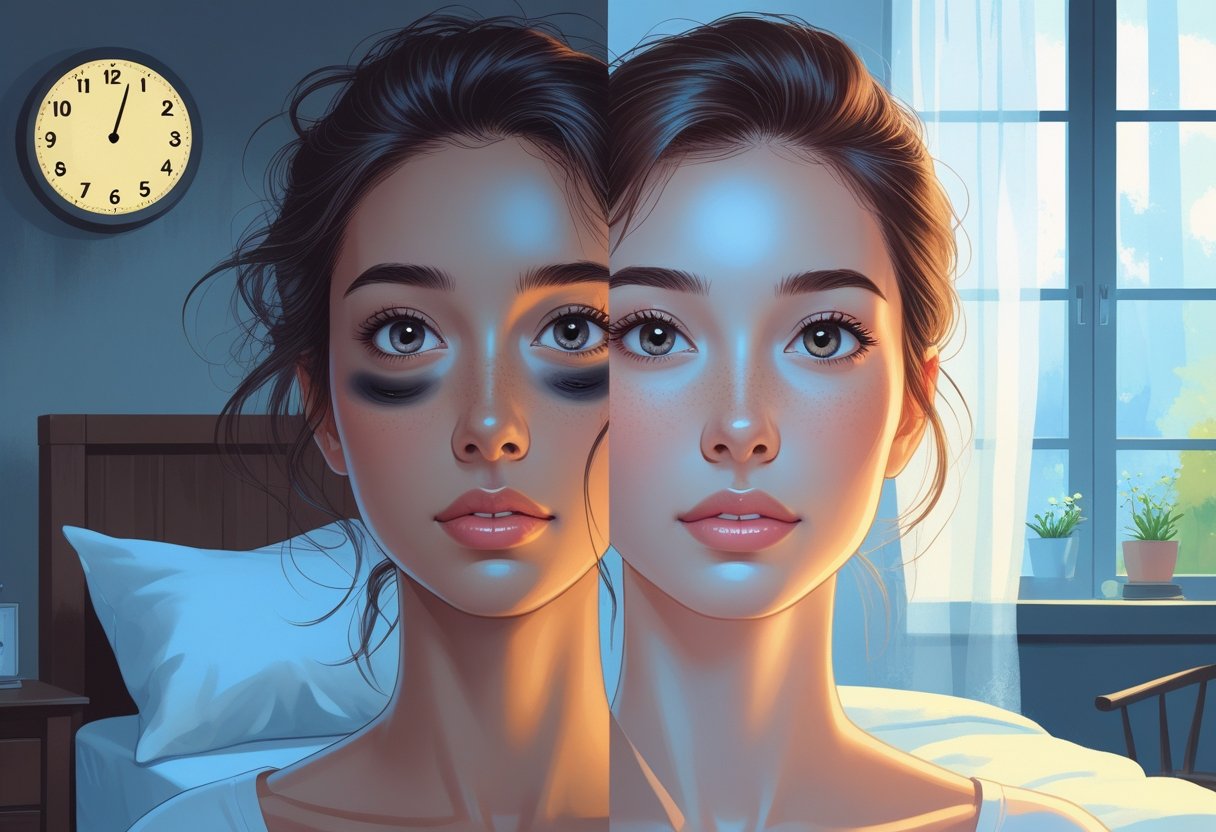
Benefits of Quality Sleep for Beauty
Getting enough good sleep gives the body time to repair itself. It helps skin stay strong, hydrated, and smooth, while also reducing signs of aging and tiredness. Rest affects how wrinkles form, how bright the skin looks, and how fresh the eyes appear, all of which shape a healthy and balanced look.
Reduction of Wrinkles and Fine Lines
During deep sleep, the body releases growth hormones that repair skin cells and strengthen collagen. Collagen keeps skin firm and elastic. Without enough rest, collagen production slows down, leading to early signs of aging like wrinkles and fine lines.
When sleep is lacking, cortisol levels rise. This stress hormone weakens collagen and elastin, which speeds up aging and causes skin to lose firmness. Keeping a steady sleep schedule of 7 to 9 hours each night helps skin repair itself and reduces the appearance of wrinkles over time.
Improving Skin Complexion and Radiance
Sleep helps skin recover from daily exposure to sunlight, pollution, and stress. This repair process smooths texture, evens out tone, and brings back natural brightness. Well-rested skin stays more hydrated and shows a healthy glow, while poor rest leaves it looking rough and dull.
At night, the skin also locks in moisture better. This keeps dryness away and supports a radiant look. Stable hormone levels from good rest reduce breakouts since less cortisol means less inflammation and oil. Simply put, consistent sleep is key to keeping skin clear and glowing.
Encouraging Younger-Looking Eyes and Less Puffiness
Adequate rest helps the body clear out excess fluid that builds up around the eyes overnight. This lessens puffiness and swelling, which are clear signs of fatigue. People who get good sleep usually wake up with smoother, refreshed skin under their eyes.
Not getting enough sleep can cause dark circles due to poor blood flow. Rest improves circulation and oxygen levels, which helps lighten these shadows. Sleep also relaxes facial muscles, easing tension that creates fine lines around the eyes. Sleeping on the back protects delicate skin and reduces pressure, keeping the eye area looking younger.

Skin Sleep: Nighttime Repair and Renewal
While sleeping, the skin is involved in significant repair processes that enhance its structure, moisture levels, and general health. Chief biological functions take place predominantly during deep sleep, aiding in cell regeneration and hormone secretion. Certain skin care routines may assist in maximizing such natural nighttime benefits.
The Role of Deep Sleep in Skin Recovery
Sleep is more than rest for the mind, it’s when the skin repairs itself. At night, the body works on cell renewal, moisture balance, and overall skin health. The deepest stages of sleep are especially important, since this is when most of the repair takes place.
Growth hormones peak during deep sleep. These hormones push the skin to build proteins, replace damaged cells, and create more collagen. Collagen is what keeps the skin firm and helps it recover from daily stress. Between 10 PM and 2 AM, cell turnover is at its highest, and blood flow increases, carrying fresh oxygen and nutrients while clearing away waste.
Deep sleep also helps the skin hold water, so it stays hydrated. Stress hormones like cortisol drop, inflammation eases, and antioxidant defenses kick in. All of this protects against daily wear, reduces damage from the environment, and supports DNA repair.
Best Nighttime Skin Care Practices
Applying skincare about half an hour before bed allows it to sink in better while the skin is at work. Using products in order from the thinnest to the thickest texture helps each one absorb properly. How you sleep also matters. Lying on your back with a satin or silk pillowcase keeps the skin from pressing into fabric and forming wrinkles. Raising your head slightly helps fluids drain so you wake up with less puffiness.
The bedroom environment plays a role too. Keeping the room cool, around 65-68°F (18-20°C), and maintaining some humidity prevents the skin from drying out. Cutting off screens an hour before bed lowers blue light exposure, which helps melatonin levels and gives the skin a better chance to recover overnight.
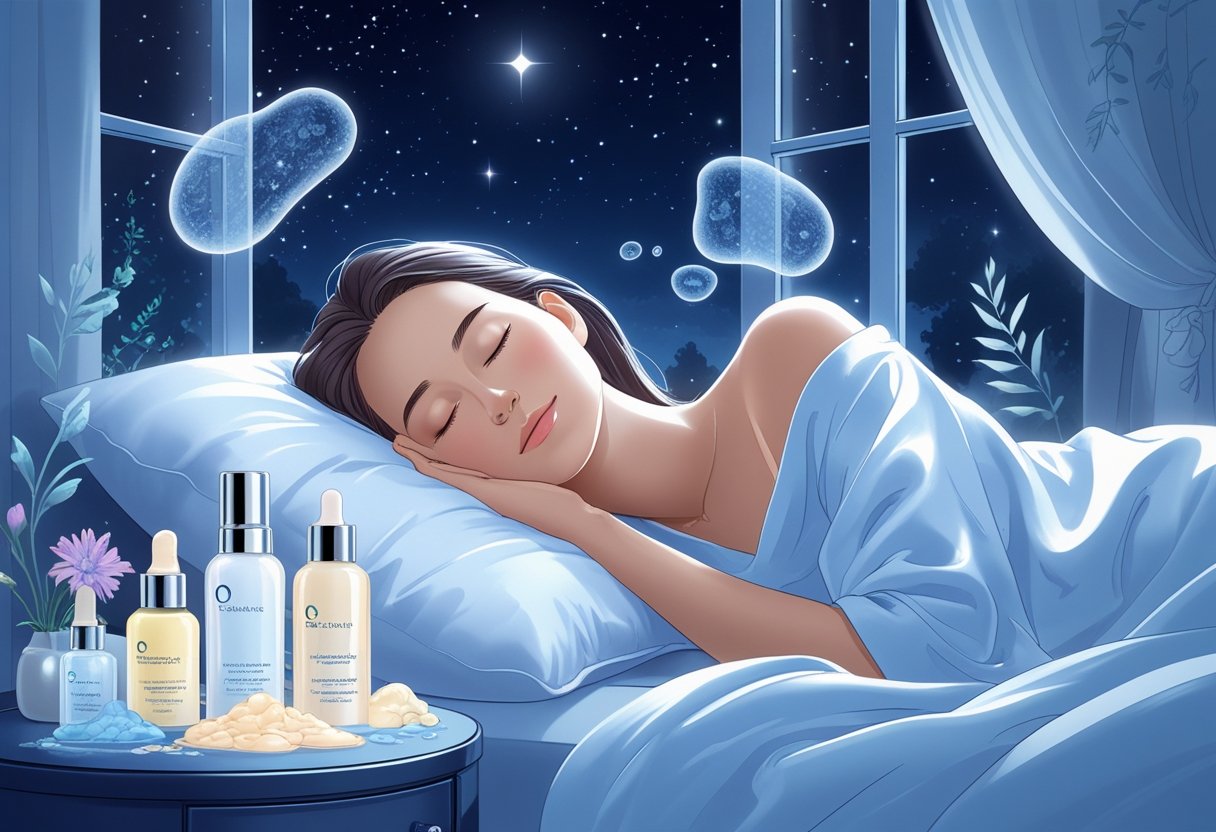
Optimizing Your Beauty Sleep Routine
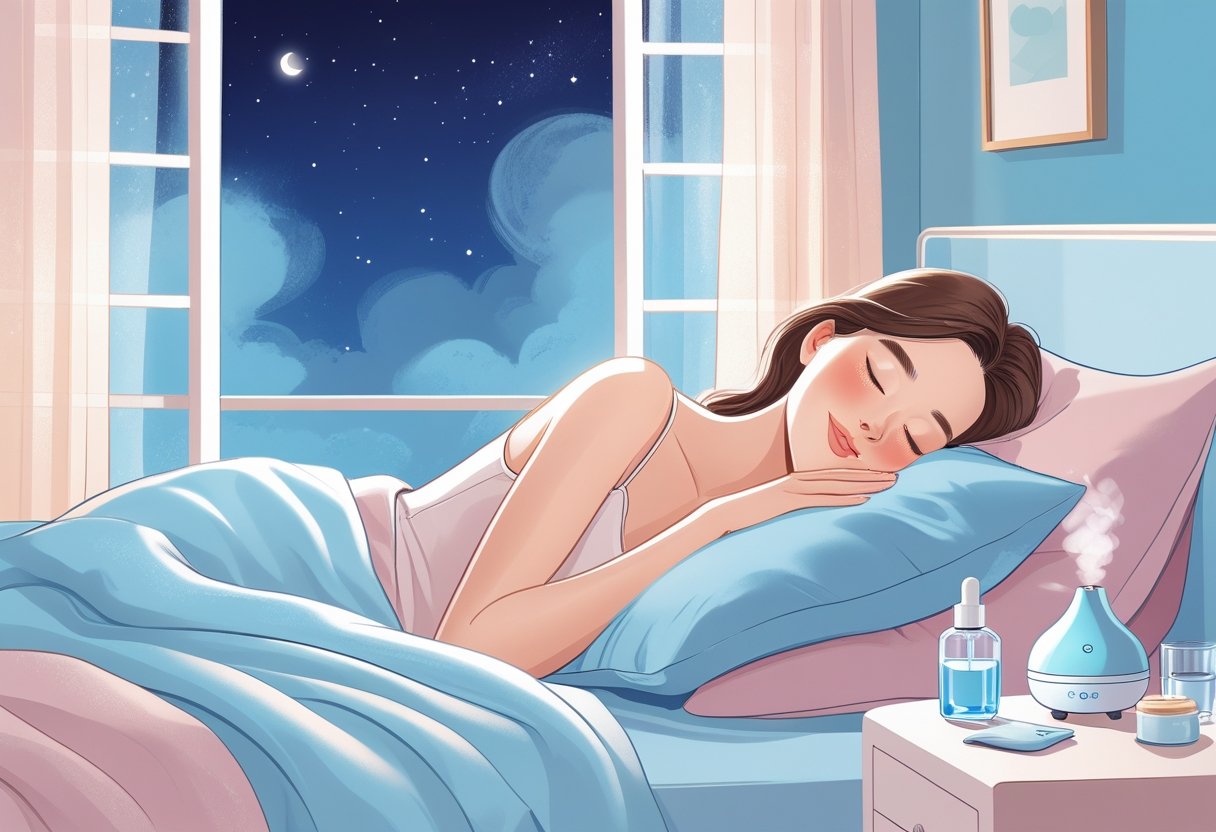
Beauty sleep supports the body’s natural repair process. Getting quality rest helps the skin recover, and setting up healthy sleep habits can improve both hair and skin over time. Small changes in nightly routines, sleep setup, and daily choices can make a clear difference.
Going to bed at the same time each night signals the body to wind down. Turning off phones and other screens at least an hour before bed helps because blue light interferes with melatonin, the hormone that controls sleep. Instead, try reading, stretching lightly, or meditating for a few minutes to lower stress. Cutting down on caffeine and skipping heavy meals late in the day makes it easier to fall asleep. Applying skincare 30–60 minutes before bed gives products time to absorb without rubbing off on pillows.
A consistent sleep schedule, such as 10 PM to 6 AM, matches the hours when skin cells repair themselves most effectively.
Selecting the Appropriate Sleeping Environment
The bedroom plays a major role in how well you sleep and how your skin feels. Keeping the room cool, around 65–68°F (18–20°C), helps lower inflammation and supports deeper sleep stages when the skin repairs itself most.
Moisture balance matters too. A humidity level of 40–60% keeps skin from drying out. Using blackout curtains or an eye mask blocks light and helps the body produce melatonin naturally. Sleeping on your back can limit wrinkles and puffiness, while silk or satin pillowcases reduce friction and help the skin stay smooth.
Diet and Lifestyle Tips to Improve Sleep Quality
What you eat in the evening can influence how well you sleep. Foods rich in tryptophan, like nuts or turkey, encourage the release of serotonin and melatonin. Including magnesium in dinner can also support collagen and improve sleep quality.
Limiting drinks before bed cuts down on waking up during the night and helps prevent facial puffiness. Stress control matters too, since high cortisol levels from stress can trigger excess oil and inflammation in the skin. Short breathing exercises or meditation can bring these levels down. Staying hydrated and following a balanced diet supports long-term benefits of good sleep for skin health.
Long-Term Effects of Sleep on Beauty
Sleep plays an immense role in how the hair and skin age as time passes. Sleeping poorly can lead to changes that appear not just on the surface but also in terms of skin health. Good sleep each day maintains repair and keeps aspects of the face appearing healthier with each passing day.
Aging and Sleep Patterns
Poor sleep speeds up skin aging. When someone does not get enough rest, the body produces less collagen, the protein that keeps skin firm and flexible. This leads to more wrinkles, fine lines, and sagging. Sleep loss also raises stress hormones like cortisol. Higher cortisol levels break down skin structure and trigger inflammation. Over time, this shows up as wrinkles, dullness, and rough texture.
Low-quality sleep also weakens the skin’s repair system. Damage from sun and pollution does not heal as well. The skin may look tired, uneven, and less vibrant.
Nightly Sleep for Enduring Beauty
Getting enough sleep every night supports healthy skin and hair. The body repairs cells and increases blood flow during rest, which helps the complexion look clear and fresh.nSleep also helps control oil in the skin and scalp. Balanced oil levels reduce oily skin, dandruff, and hair loss related to stress.
Adults should aim for 7-9 hours of sleep each night. Sticking to a schedule and having calm bedtime routines helps prevent dark circles, puffiness, and other visible effects of sleep loss.
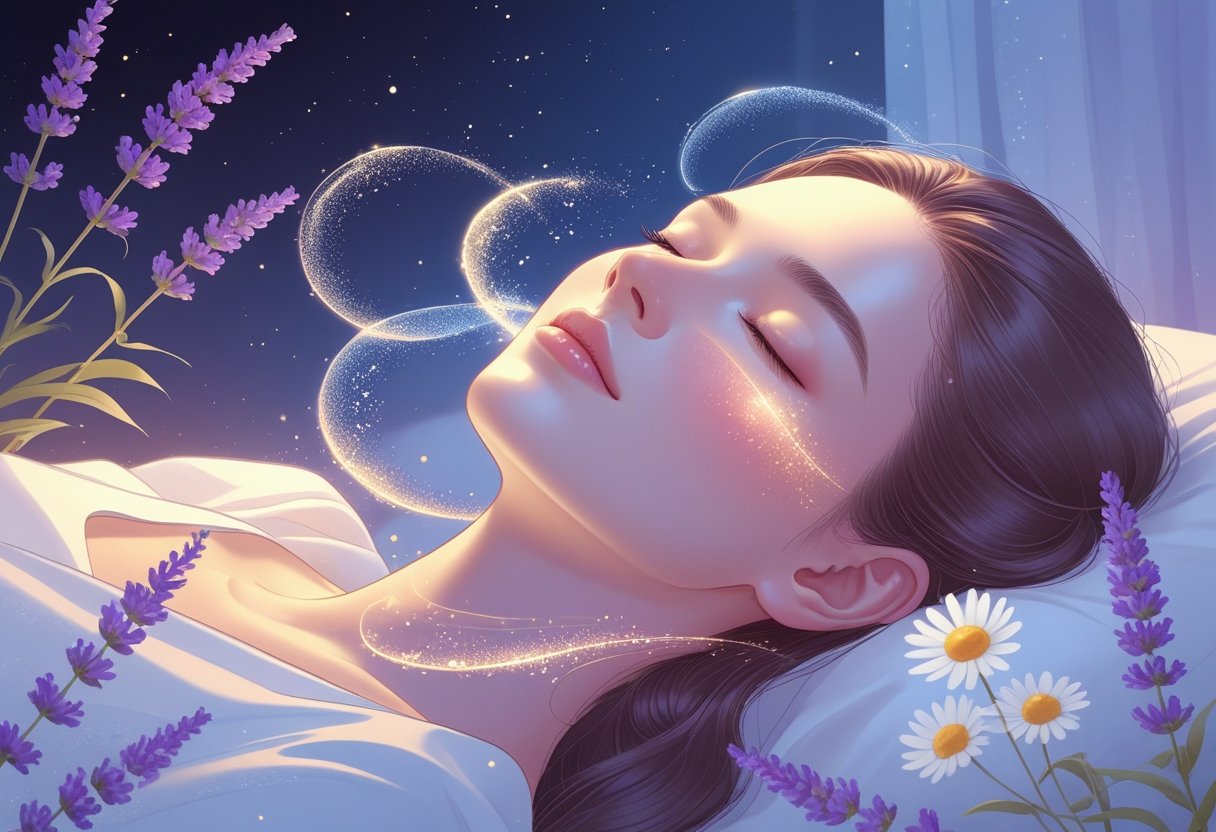
How Mattress Choice Enhances Skin and Vitality
The right mattress is important for skin well-being and general vitality. A mattress that supports your body keeps your spine in line. This allows you to reach deeper sleep, and in these stages, the body releases growth hormones. These hormones help the skin stay firm and repair itself.
A mattress that eases pressure points can reduce tossing and turning. Less movement during the night can help prevent puffiness and sleep wrinkles. Proper support also improves blood flow. That brings more oxygen and nutrients to the skin and removes waste. The result is clearer, healthier skin.
Keeping cool while you sleep matters too. A mattress that regulates temperature helps the body rest properly. This supports skin healing and keeps cells healthy.
Key mattress features for skin and vitality include:
- Medium-firm support for spine alignment
- Breathable, moisture-wicking materials
- Durable layers that stay comfortable over time
A good mattress affects how rested you feel and how your skin looks. Poor support can cause dull skin and early signs of aging. The Bear Natural Mattress is built to help the body repair itself while you sleep. It uses organic cotton, wool, and responsive coils to create a supportive, comfortable surface. Its layers ventilate for better temperature control. The mattress provides pressure relief and steady support. Sleep on it and you may notice healthier-looking skin and a brighter start to the day.
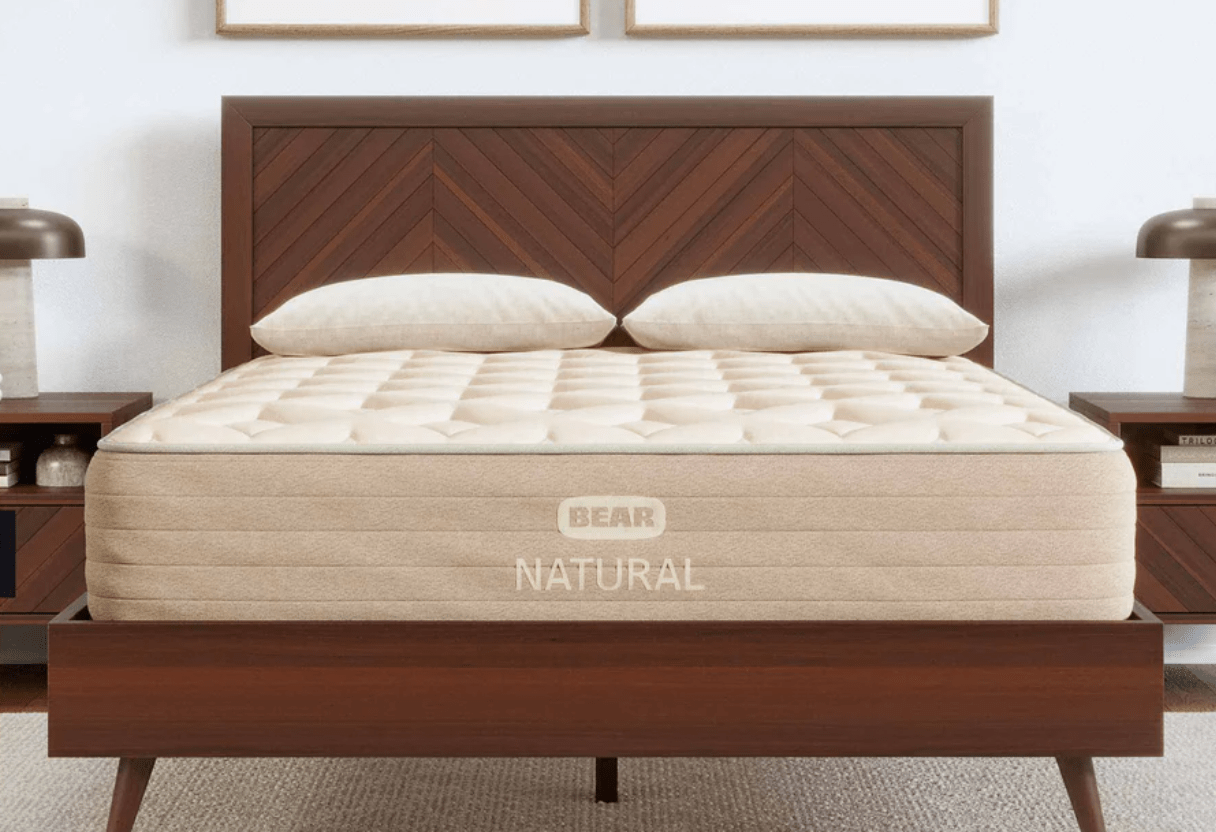
Frequently Asked Questions
Sleep is important in skin repair, hydration, and slowing down aging. Knowing how factors like sleep length, timing, and routine affect your skin can help you take better care of it.

